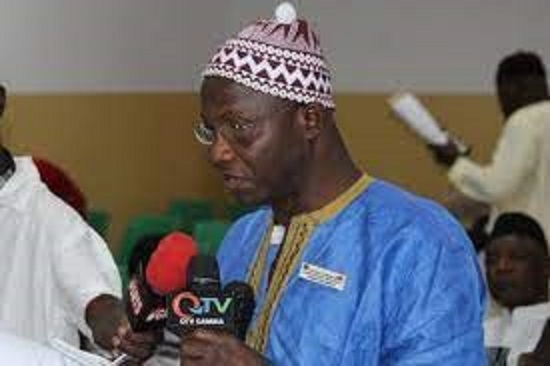By Musa Sanneh
History indeed repeats itself. The repetition is sometimes strange, and at other times grotesquely sad. Recently, a member of the Ivory Tower Executives of PDOIS made a combustible rambling about this author and the exposé of his column in The Gambia Times. Distortions and misrepresentations aside, which fortunately some readers were able to point out for themselves, the executive concluded that this author and his associates are prophets of “doom and gloom” who extols neither the past administrations of The Gambia nor the opposition political parties. He charged “that rather than offer knowledge and alternative policies we are out to create doubts in the minds of the gullible; and that where ideological divergence becomes a contention, the author — a long-time member of PDOIS himself (full disclosure) — should exit PDOIS and establish his own party. Moreover, he added that in the absence of the author’s alternative economic plan, the inherent flaws in the party’s “Transformative Agenda” should be allowed to blossom unscrutinized. Interesting. Isn’t it?

But leaning on Shakespeare’s 17th Century play, “the Merchant of Venice,” we are comforted by Antonio’s reminders that even “the devil can cite a scripture for his own purpose.” The only issue here is that the tempest in the scripture offered by the executive is actually much ado about nothing. History, the glorious teacher of all times, has indeed recorded that some of the statements uttered by the executive were the exact statements that were uttered in 1986 against PDOIS by critics when it first emerged. As the sirens against the political and economic malfeasance of that era got louder and reverberated across the greater Banjul and Kombo St. Mary’s areas, Gambians were told that the protagonists of those sirens are in fact false prophets out to occupy and create doubts in the minds of the people. So, unsurprisingly, when the descendants of the protagonists of that era are being told today that they are prophets of doom and gloom and are out to create doubts in the minds of the people, certainly, and by all means, that is a badge of honor. And proud we are wearing it. Pressuring people to re-affirm, re-declare their membership, citizenship, loyalties and what have you or in other circumstances expelling them on the basis of ideological differences with members of the executives are all nothing new if one is familiar with the playbook use by dictators all around the world. For dictatorship, one must either conform to the principles of “group think” or face banishment. No surprises. It only confirms that history, indeed, sometimes repeats itself. If the repetition in 1986 was strange, this time in 2021, it is grotesquely strange and sad. Dare we say, if the answer to the charge in 1986 was no we are not false prophets, so too in 2021, the answer must emphatically be no we are not prophets of doom and gloom. What we are doing is what every responsible citizen ought to do. Flushing out the flaws in “policy” documents before they doom our existence as a country must not be derogated to false prophecy. And where levers of power are tilted too far toward the leadership that imposes stultifying totalitarian control to the extent that their thoughts and actions are beyond scrutiny by people whose lives will be impacted by such thoughts and actions, then it should not come as a surprise when principled people begin to take up their stands. The scrutiny must therefore continue.
Take an example of the sermon contained in the Transformative Agenda—Policy Directives 3.2:
“In 2007 alone rice import to the Gambia amounted to 557 million dalasis; tomato paste, 121 Million dalasis; onions, 18 million dalasis; flour, 130 Million dalasis; vegetable oil, 457 Million dalasis; fruits and vegetables, 57 Million dalasis; Milk and Milk products, 149 million dalasis. If agriculture is linked to processing by cottage or light scale industries, financed by cooperative financial institutions, a sum of over 1489 Million dalasis would have been put in the hands of Gambian producers in one year” [sic].
Really?
We hold the view that such quantative method of analysis is not only overly simplistic but it is also too good to be true. To assume that by merely “linking agriculture to processing by cottage or light scale industries financed by cooperative financial institutions a sum of 1489 million would be put in the hands of Gambian producer in one year” is more ideological than ideational. That is to say, it’s burlesque. Not only is the assumption deficient of logic but also ignores the substantial empirical record of what obtained in The Gambia. In 1975, for example, food imports as a percentage of GDP were in the single digits of 7 percent. By 1986, however, the food importation increased by over a 100 percent as a percentage of GDP—notwithstanding the establishment of more food and food processing enterprises. But that’s not the only deficiency.
Most importantly, built into the assumption is the thinking that the cost of the factors of production of the imported goods in their countries of origin, including other associated costs such as freight charges, exchanges differences, tax breaks and subsidies together must either be equal to their cost of production in The Gambia or even less. For such a scenario to be true, one must entirely disregard the fundamentals of absolute and comparative cost considerations.
The assumptions contained in the ‘Transformative Agenda’ are possible only in the theoretical world. In the real world where the readers and I live, however, it’s a different story. Elemental economics teaches that it’s not everything that is producible in a country should actually get into the production line. Doing so may be at your comparative disadvantage and therefore not an optimal deployment of the country’s resources. Thus, absent comparative cost data along with the relevant economic analyses that goes into such determination, the conclusion, by all scientific means cannot stand and must therefore be contested.
In fact, it is precisely because of such fuzzy thinking coupled with the often-distorted approximations I insist that the translation of the projections in the model—whatever name you choose to call it— be expressed into algebraic equations so that their predictive accuracy could be tested with laser precision. Whether the manifesto should include such work or not is totally irrelevant as it does not make the availability of such information unnecessary or redundant. You neither have to be the Minister of Finance nor the governing administration to produce these relevant-background works of your economic policy. When past policy experiences offered little, if any comfort to the soul of the nation, rigorous thinking must by default claim the center stage. A party that is calling for a System Change cannot at the same time clinch onto the same tired way of thinking about what a manifesto contains or not.
On the question of the Audit Report by Ernst & Young, you got me right honorable. I contend that given the provisions of Section 100 of the Constitution, and PART IV, Subsection 27 of the Public Finance Act, members of the national assembly has failed in their responsibility. If you insist that the blame should be directed at the executive branch, I claim that you also bear some responsibility. Besides legislative and constituency work, your job description also includes oversight functions. Where members of the National Assembly failed to put forth private-member bills with a view to correcting the anomalies contained in the audit report and following through on the details of the bill, cleaning your hands off the malfeasance contained in the report is an affront to all Gambians. Don’t tell me that the Auditor General has the “bread and the knife.” That is a punt and you know it.
To conclude, we acknowledge and sincerely extend our genuine admiration for the lone member from the Ivory Tower. Coming off the high horse to discuss issues of mutual importance should not be a matter of self-adulation but of necessity. Indeed, when PDOIS decentralization efforts were discussed in 2018 at the General Committee Forum on WhatsApp and until the project came under the stultifying clampdown, you were the only executive whose presence was registered. To agree to disagree does not diminish anyone in any form or shape. And where robust policy debate did not lead to better outcomes, this author is highly doubtful that ideological dogmatism and religious adherence to ideological purity will. In that context, this column is very grateful for your contributions. We strongly disagree with your positions, yet remain very respectful to your person and views.
Until I come your way again, this is your nephew, Musa Sanneh.

